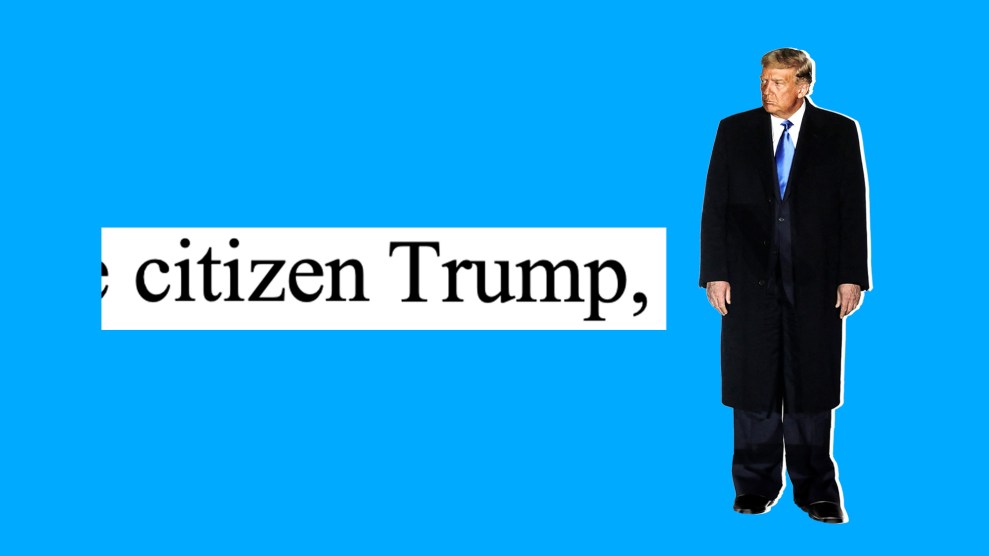
Mother Jones illustration; Yuri Gripas/Abaca/ZUMA
On Tuesday morning, a federal appeals court in Washington, DC, told Donald Trump to get lost. That is, it rejected his claim that as a former president he has total immunity for actions he took while in the White House. Trump had cooked up this argument to challenge the indictment filed against him by special counsel Jack Smith, who hit Trump with four charges for illegally trying to overturn the 2020 election.
The long-awaited 57-page ruling issued by the three-judge panel is not full of fiery rhetoric. But it does contain a few sharp punches aimed at Trump’s contention that a president should possess king-like power. Here are some excerpts.
The court said Trump has no special standing as a former president:
For the purpose of this criminal case, former President Trump has become citizen Trump, with all of the defenses of any other criminal defendant. But any executive immunity that may have protected him while he served as President no longer protects him against this prosecution.
Trump argued that potential prosecution in the future could chill presidential action. The court said, no way:
Former President Trump argues that criminal liability for former Presidents risks chilling Presidential action while in office and opening the floodgates to meritless and harassing prosecution. These risks do not overcome “the public interest in fair and accurate judicial proceedings,” which “is at its height in the criminal setting.”
The court had a bit of a ha-ha moment, which many legal observers anticipated, when it pointed out that Trump’s lawyers had argued during his last impeachment that his actions related to the 2020 election were not impeachable and that the appropriate venue for judging them would be a courtroom. Gotcha, said the court:
[During] President Trump’s 2021 impeachment proceedings for incitement of insurrection, his counsel argued that instead of post-Presidency impeachment, the appropriate vehicle for “investigation, prosecution, and punishment” is “the article III courts,” as “[w]e have a judicial process” and “an investigative process . . . to which no former officeholder is immune.”
Trump said that without total immunity, former presidents would be mercilessly harassed. Unlikely, said the court, you’re the only president to be federally indicted:
[F]ormer President Trump’s “predictive judgment” of a torrent of politically motivated prosecutions “finds little support in either history or the relatively narrow compass of the issues raised in this particular case,” see Clinton, 520 U.S. at 702, as former President Trump acknowledges that this is the first time since the Founding that a former President has been federally indicted. Weighing these factors, we conclude that the risk that former Presidents will be unduly harassed by meritless federal criminal prosecutions appears slight.
The court noted that Trump’s position made no sense. How could the guy in charge of enforcing the law be above it?
It would be a striking paradox if the President, who alone is vested with the constitutional duty to “take Care that the Laws be faithfully executed,” were the sole officer capable of defying those laws with impunity.
What also doesn’t make sense, the court said, was a policy that would allow a president to break laws just to overturn an election and stay in power. That could be the end of democracy:
We cannot accept former President Trump’s claim that a President has unbounded authority to commit crimes that would neutralize the most fundamental check on executive power—the recognition and implementation of election results. Nor can we sanction his apparent contention that the Executive has carte blanche to violate the rights of individual citizens to vote and to have their votes count.
On the last page of its ruling, the court suggested that Trump’s argument threatens the entire constitutional order and, if adopted, could destroy the republic.
At bottom, former President Trump’s stance would collapse our system of separated powers by placing the President beyond the reach of all three Branches. Presidential immunity against federal indictment would mean that, as to the President, the Congress could not legislate, the Executive could not prosecute and the Judiciary could not review. We cannot accept that the office of the Presidency places its former occupants above the law for all time thereafter.
Bottom line: Not on our watch, the court declared.

















